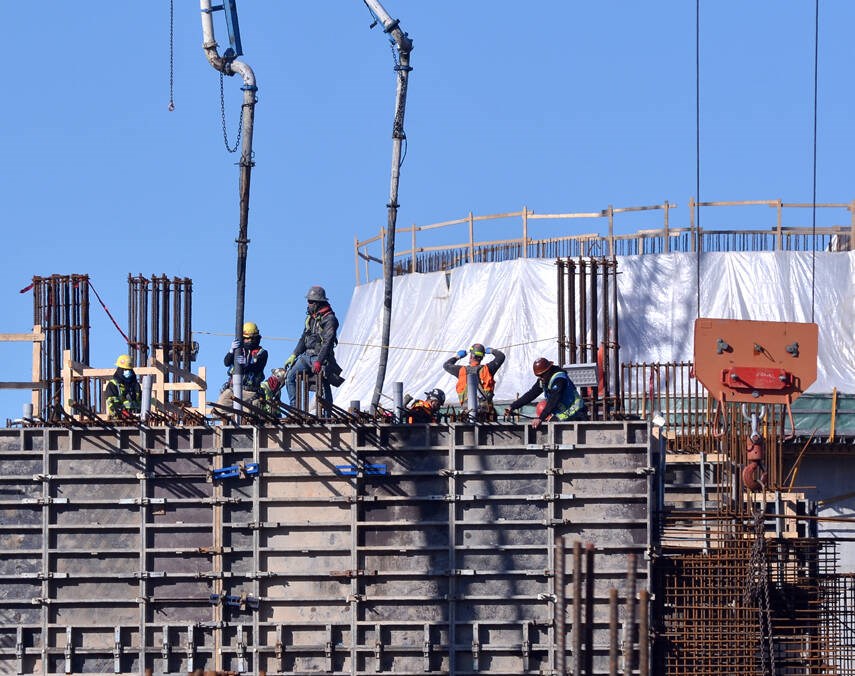Utility rates paid by homeowners for water, sewer and garbage collection on the North Shore are going up.
Rising labour costs, greater demand for service in places like public parks, and the need to replace or upgrade aging infrastructure are among the factors driving rate increases soon to hit North Shore households.
Some of those are beyond the control of municipalities, local politicians stressed as they discussed the fee hikes at council meetings across the North Shore.
In fact, just what kind of sticker shock is coming in future likely won’t be known until Metro Vancouver comes up with a plan on how much it’s going to cost to complete stalled construction on its North Shore Wastewater Treatment Plant – and who will be footing the bill.
Staff recently walked councils in West Vancouver and North Vancouver through increases coming this year, and what some of those fee hikes could look like in the years ahead.
In West Vancouver, fees for solid waste – including garbage, recycling and organics – are expected to go up around $34 this year – from $313.74 last year to $347.68 for single family homes. Key cost drivers include inflation, increased use of public parks and an associated increase in garbage collection and expanded recycling programs in parks.
Trash volumes went up during pandemic
A staff report in West Vancouver noted that after years of declining residential waste volume, during the COVID-19 pandemic, the amount of trash being tossed as people worked from home increased and has yet to fall back to pre-pandemic levels. Volumes of green waste also spiked 10 per cent higher.
Sewer and water rates are also going up, fuelled by the increased cost of buying bulk water from Metro, plus local system maintenance and upgrades.
Pumping station upgrades, new reservoir on tap in West Van
Two major projects expected to impact future water costs in West Van include a $15.4 million Westmount pump station and reservoir upgrade and a $6.3 million replacement for the aging 11th Street pumping station. A second $4.2 million reservoir on Cypress Bowl Road to provide water to neighbourhoods above the highway in West Vancouver is also in the works.
Water costs in West Vancouver will go up an average of five per cent – from $884.78 to $928.80 – or a $44 increase for a median single-family household.
Sewer costs are also going up, rising from current fees of $1,438 to an estimated annual charge of $1,553 for single-family homes in 2024 – up about $115 over last year.
Utility fees up between 7 and 14% in North Van
Similar increases to utility fees were adopted in the District of North Vancouver where utility fees will increase a combined 7.1 per cent for single-family homes, resulting in utility fees of $2,172 for an average single-family home in 2024 – an increase of just over $143. Utility fees for apartments are expected to clock in around $1,550 in 2024 – a 7.8 per cent increase.
Utility rates are also going up in the City of North Vancouver – by just under $200 for single-family homes and $100 for apartments. That will mean utility fees of $1,801 for single-family homes, $1,606 for duplexes and $872 for apartments in the city – up between 12.3 and 14.4 per cent over last year.
Half of utility fees from Metro levies
Staff reports at all three municipalities noted that about 50 per cent of the utility fees come from Metro Vancouver, which supplies water as well as sewer treatment. Staff also noted that future projections so far don’t include the true costs of the North Shore’s new sewage treatment plant, currently budgeted at more than $1 billion. That figure is expected to rise significantly when final cost estimates are revealed sometime next year.
City of North Vancouver Mayor Linda Buchanan pointed out that North Shore politicians were key in pushing the Metro board to adopt a 30-year amortization period for the beleaguered project – twice Metro’s usual 15-year amortization schedule.
City of North Vancouver Coun. Don Bell said when tax notices go out, it’s important that the city spell out what part of the bill is set by the city and what is set by Metro or the province (in the case of the school tax).



